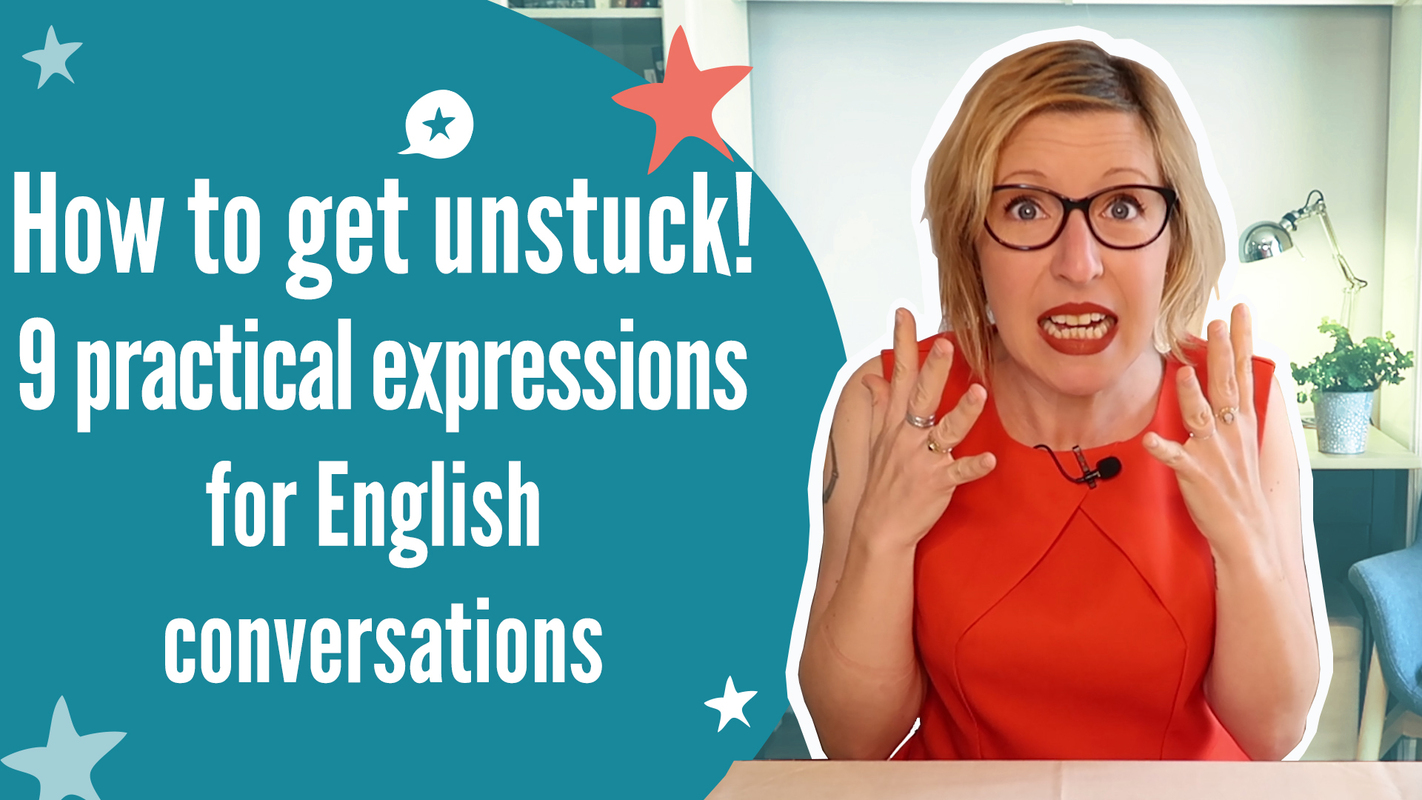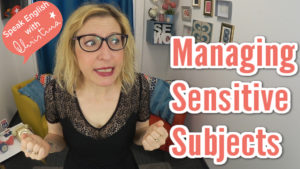
What does it feel like when you get “stuck” in English?
Imagine, you’re in the middle of a normal English conversation with your colleagues or clients.
Everything is going well.
And then you just lose your words.
You’re stuck.
I work with a lot of people who need to work and communicate in English–but English is not their native language.
Sometimes they tell me things like:
- I feel frustrated when I can’t find my words
- I feel like I have half a brain when I speak
- I can understand when others speak, but I’m slow to find my words
I know what it feels like too.
I still get stuck sometimes in French, and I’m fluent in French.
And it definitely happens often now that I’ve started learning German.
But I’ve also learned a few new phrases and techniques so that I can feel confident going into conversations.
Today, I have 9 things you can say to get unstuck in a conversation in English.
Index:
1. Advanced English Phrases for Getting Unstuck: Situation #1: You don’t find the word you need
2. Advanced English Phrases for Getting Unstuck: Situation #2: You forget your ideas
3. Advanced English Phrases for Getting Unstuck: Situation #3: You don’t know what to respond
1. Advanced English Phrases for Getting Unstuck: Situation #1: You don’t find the word you need.
It’s going to happen. There will be times when you can’t find the words you need.
Remember, confidence is not speaking English perfectly.
It’s knowing you can easily start speaking again after you get stuck.
Learn one of these phrases so that you know how start talking again:
“Ah, it’s on the tip of my tongue!”
his is a really common idiom in English. Probably because we forget words all the time.
It means you know the word but can’t think of it just now. Someone will probably help you find it.
“I don’t know the word, but it’s…”
Start with this phrase and just describe your word or expression afterward. That way you can still get your point across.
“Oh, my mind just went blank…”
This gives you a minute to find the words you are looking for.
But know that if you’re ever really, really stuck, it is ok to say “Oh never mind, it’s not important” and change the topic.
Maybe the most important thing you can remember is that this happens to everyone.
It’s ok if it happens to you.
That’s why we have all these expressions!
Smile, be light. Don’t stress.
Also check out my lesson: Changing the Subject in Conversation.
2. Advanced English Phrases for Getting Unstuck: Situation #2: You forget your ideas
This probably happens to you in your native language too.
You start explaining something, and then can’t remember what you planned to say.
Again, it happens to everyone!
That’s why we have some expressions for just this situation:
“I don’t know where I was going with that!”
“I forgot what I was going to say… Anyway…”
Conversation is not a test.
Conversation is not an evaluation of your level.
Conversation means connecting with others and exchanging information.
It’s normal to get stuck sometimes.
But after this lesson, you’ll have the tools to get unstuck, and feel more confident.
Also check out my lesson: How to Avoid Awkward Silences in Conversations in Small Talk.
3. Advanced English Phrases for Getting Unstuck: Situation #3: You don’t know what to respond
Don’t panic.
When someone asks a question, you have to think about ideas AND your words.
That’s a lot for your brain!
It’s normal if you need a bit of time.
Giving yourself time to think is smart and native speakers do it all the time.
Here’s what to say when you need a minute to think:
“Let me think about how to answer that”
“Let me think about how to explain that.”
“Good question. What do YOU think?”
I like this one because it gives you lots of time to think!
And it keeps the conversation going.
If you get stuck in your English conversation–congratulations!
Forgetting a word or what you were going to say is normal.
It happens to native speakers too.
Asking for a minute to think before you answer, or asking what your conversation partner thinks does not mean you are slow.
On the contrary! Those are really good communication skills.
I hope you have the opportunity to use one of these 9 expressions I’ve shared today.
It means you’re pushing yourself to have plenty of conversations in English. Keep up the good work!
Also check out my lesson: Managing Sensitive Subjects in Small Talk.
Take the next step: Improve your English in the comments
The best way to become more confident using Business English is to practice!
Here’s your weekly challenge for this week:
- In the comments, tell us about a situation where you typically feel stuck in English.
- Pick one of the expressions from this post that you can use next time you get stuck and write it in the comments.
a) Brain tip: If you anticipate and plan for a “bad” situation, you are more likely to overcome that situation! So think ahead for the time when you will be stuck in English–because it will happen!
If you learned something from this lesson, please share it with your coworkers & friends. You can send your message to them in English for more practice!
Click here to share this article on LinkedIn
Click here to share this article on Facebook
Become more fluent & comfortable in conversations
If you would like to take the next step with me, discover my Faster Fluency Conversation Club Membership Program!
It helps you become more confident speaking in conversations, and get a lot more vocabulary on many different topics! And it’s a fabulous community of “English buddies” from around the world!
TIP: Use the code FFCC40 to save -40% off your 1st month of membership!
More details at https://christinarebuffetcourses.com/faster-fluency-conversation-club/join-now
Can’t wait to see you in the Club,
Christina
More good stuff…
Click the image to learn more








Hi Christina! Thank you for wonderful insightful article on what to do when stuck in my english conversation or when I have forgotten a word I wanted to say. I had an experience where I wanted to use the word “jeopardise” in my interview and I couldn’t remember it for about 30 seconds. Then I had to explain it in the other 🙂
The phrase “let me think about how to explain that” is going to be of profound impact in my english conversation to help me unstuck.